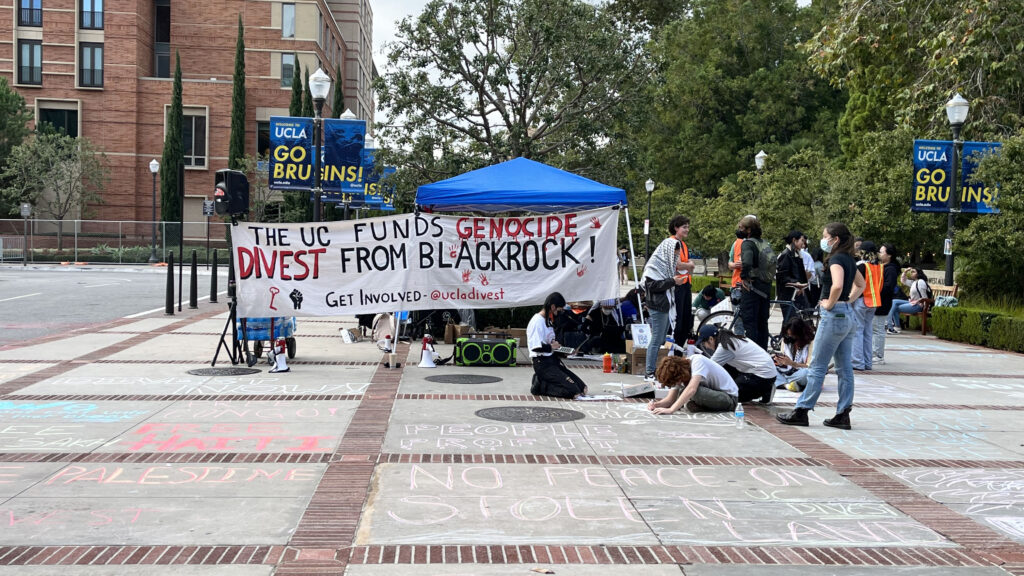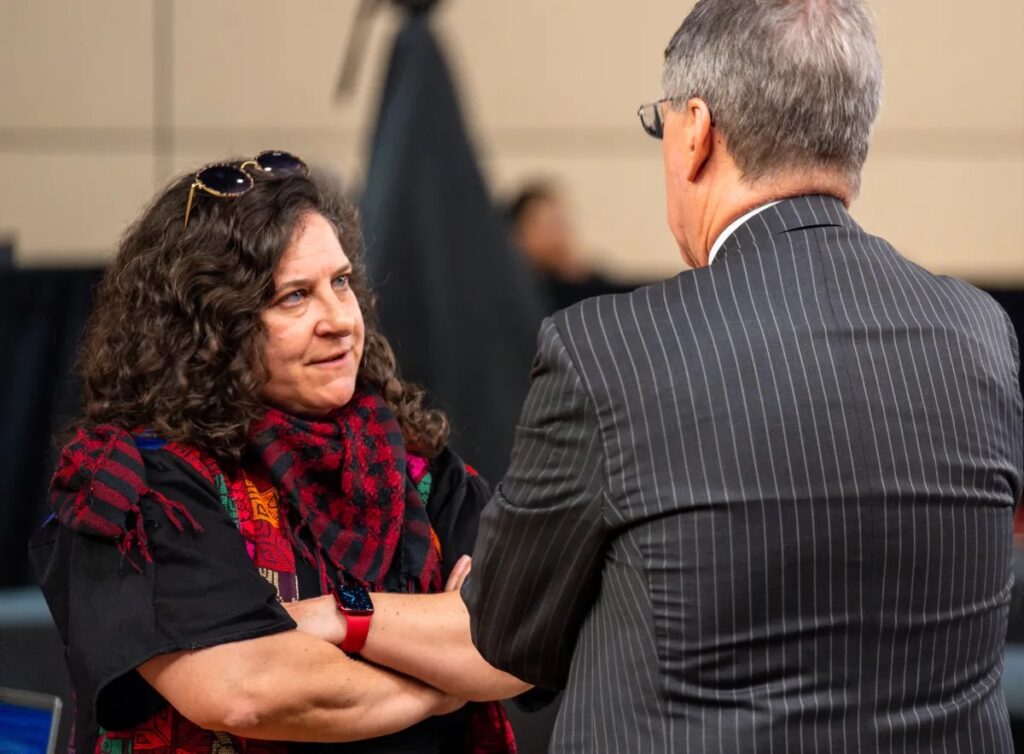
Student advocates prepare to march outside the UC Board of Regents meeting at UCLA on Nov. 16.
Credit: Mallika Seshadri / EdSource
Students on California campuses are fearful and upset six weeks into the Israel-Hamas war, with Islamophobia and antisemitism on the rise at colleges across the country.
The climate across the University of California system is especially tense and has students feeling unsafe, forcing system officials to navigate a delicate issue that is painful for many on its 10 campuses.
Systemwide leaders and campus chancellors have, over the past several weeks, made several statements about the war and what they’re doing to keep students safe, but it’s been a challenging endeavor. Students and other stakeholders have regularly criticized UC officials for both what they have and haven’t said.
Earlier this month, UC and California State University officials were criticized by the California Legislative Jewish Caucus for not more forcefully condemning antisemitism on their campuses. Days later, when UCLA Chancellor Gene Block condemned what he labeled antisemitism at an event organized by Palestinian students, his statement was rebuked by those students who denied the charges of antisemitism and accused UC officials of a double standard for ignoring attacks against Palestinian, Arab and Muslim students.
Now, UC is going beyond words and statements. UC President Michael Drake last week announced that his office is committing $7 million toward addressing antisemitism and Islamophobia on campuses. Drake hopes the effort will tangibly benefit students and ease their anxieties by investing in emergency mental health resources, new educational programs and training for staff, including around free speech.

It’s a start, said Celene Aridin, a UC Davis student and president of the UC Student Association who had appealed to the president’s office for more mental health services, which she said are necessary because students are grieving.
“It has not been an easy time for students who are impacted. It’s been hard for them really to just go to school and attend classes normally. Their mental health is not OK. They are not OK,” Aridin said.
The $7 million investment is a “smart approach,” according to Kristen Shahverdian, senior manager of free expression and education at PEN America, an organization that advocates for free speech on college campuses and in general.
“I think that they’re looking at some of the areas where there clearly are gaps and need some more robust resources,” Shahverdian said. “That it’s not just one lane I think is really important, that they’re coming at this from a lot of different directions.”
The Oct. 7 Hamas attack on Israel killed about 1,200 Israelis, according to officials. The subsequent Israeli military response in Gaza has killed more than 11,000 people there, including at least 4,500 children, according to the Palestinian Health Ministry.
While the war has been ongoing, cases of Islamophobia and antisemitism have increased on U.S. college campuses, including reports of harassment and assaults. It has prompted a federal response, with President Joe Biden’s Department of Education last week announcing it is opening new investigations at six colleges into reports of antisemitism and Islamophobia.
Although none of its campuses are the ones being investigated, UC has been no exception to reports of Islamophobia and antisemitism.
Bears for Palestine, the UC Berkeley chapter of Students for Justice in Palestine, wrote on Instagram that Muslim students have been “assaulted, harassed and spat on” and that “in classrooms, Palestinian and Arab students have been the target of genocidal threats.” In a statement to the campus, UC Berkeley’s chancellor, Carol Christ, cited “harassment, threats and doxing that have targeted our Palestinian students and their supporters.”
Palestinian students at other campuses, including UCLA, have made similar reports. Mohammad, a UCLA student and spokesperson for the UCLA chapter of Students for Justice in Palestine, said Palestinian students at UCLA have been subjected to physical and verbal assaults.
“By just wearing a keffiyeh, it’s almost like it’s justified to call me a terrorist. By just walking around with a keffiyeh, for my friends, it’s almost justified for them to be pepper sprayed, for them to be jumped,” Mohammad said. He was granted partial anonymity because of concern for his safety.
The California Legislative Jewish Caucus, meanwhile, reported several antisemitic incidents in its letter earlier this month to college leaders, calling on them to take action to protect Jewish students. In the letter, the legislators said they heard from Jewish students at UC Berkeley, UC Davis and San Jose State who were attacked physically for supporting Israel. They also said Jewish students at UC San Diego needed a police escort to safely leave a student meeting.
In that Nov. 7 letter, the caucus members criticized UC and Cal State officials for not doing enough in response to antisemitism on their campuses. The caucus called on them to be “crystal clear in word and in deed that antisemitism — like all other forms of hatred and bigotry — will not be tolerated on our campuses.”
A Jewish student at UC Berkeley, Hannah Schlacter, said during last week’s board of regents meeting in Los Angeles that a Jewish student at her campus was hit in the head with a water bottle at a protest. She questioned why the university hadn’t labeled the incident a hate crime.
UCLA’s chancellor, Block, did make a statement on Nov. 10 condemning what he called “despicable Antisemitic language” and “extremely hateful behavior” at an event on the campus that week. He was presumably referring to a Nov. 8 pro-Palestine rally on the campus, which received national attention after some students beat a piñata of Israeli Prime Minister Benjamin Netanyahu.
Block’s statement angered the students who organized the rally, including Students for Justice in Palestine and UCLA’s chapter of UC Divest. In a statement, UC Divest said reports that antisemitic language was used at the rally were erroneous. The statement cited a New York Post report that quoted a student saying, “beat that f****** Jew” while hitting the piñata. In reality, according to UC Divest, the student said, “Rip that f****** piñata.”
“UC Divest rejects the claims that anti-Semitic actions were perpetrated by individuals at our rally and condemns anti-Semitism,” the UC Divest coalition added in its statement.
The group also accused UC of a double standard, saying that “when students ask administration for support in the wake of violent hate crimes” against pro-Palestinian Muslim students and others, “we are ignored, gaslit and invalidated.”
Students aren’t the only ones who have demanded more from campus leaders. Faculty members have weighed in too.
Last month, the UC Ethnic Studies Faculty Council, which includes faculty in ethnic studies across UC, accused UC leadership of statements “that distort and misrepresent the unfolding genocide of Palestinians in Gaza and thereby contribute to the racist and dehumanizing erasure of Palestinian daily reality.” The council’s letter was condemned by one UC regent, Jay Sures, who said it was “rife with falsehoods about Israel” and specifically took issue with the faculty asking UC to retract charges of terrorism.
And this month, a faculty coalition at UCLA criticized campus leadership for not denouncing pro-Palestinian rallies on campus. “The atmosphere on campus results in Jewish students, staff and faculty who are afraid to be on campus, show solidarity with Israel, or practice their freedom of religion in public,” the faculty wrote in the letter, which now has more than 350 signatories.
Being met with criticism from students and other stakeholders hasn’t been abnormal for college leaders over the past six weeks, said Michelle Deutchman, the president of UC’s National Center for Free Speech and Civic Engagement.
In Florida, the head of the state’s public university system attempted to ban campus chapters of Students for Justice in Palestine and was subsequently condemned by Palestinian students as well as free speech advocates.
At Harvard, critics said campus officials didn’t condemn Hamas strongly enough in their response to the Oct. 7 attack. Weeks later, when Harvard President Claudine Gay condemned antisemitism during a speech at a Harvard Hillel Shabbat dinner, she was praised by some students and criticized by others. A spokesperson for Harvard Jews for Liberation took issue with Gay conflating antisemitism with anti-Zionism and said that a “disproportionate focus on antisemitism on college campuses continues to distract from the devastating siege on Gaza,” according to The Harvard Crimson.
It’s a delicate line that college presidents and chancellors across the country have struggled to balance.
“If and when chancellors or presidents spoke, they were met with some kind of critique about what they said, and if they didn’t speak, they were also met with critique. So unfortunately, right now it feels a little bit like a lose-lose situation,” Deutchman said.
Deutchman added, though, that UC’s decision to invest $7 million into initiatives and programs to address antisemitism and Islamophobia could be a step toward benefiting all students.
Of the $7 million, $3 million will go toward emergency mental health resources for students and staff. Another $2 million will go toward educational programs, which will aim to improve the public discourse on the issue by focusing on a better understanding of antisemitism and Islamophobia as well as how to recognize and combat extremism. The final $2 million will go toward training of faculty and staff, including in areas such as free speech.
“It’s really hard to have a conversation about discourse on campus if people don’t have a foundation of what’s allowed and what isn’t,” Deutchman said. “So to the extent that they’re going to have an infusion of resources into education and training and helping all the different stakeholders on campus learn how to respond in the face of challenging speech and events, I think that’s really important.”
As for the $3 million for mental health resources, Aridin, the UC Student Association president, said she’s optimistic it will help students but she also called on UC officials to consult students at each campus before deciding specifically how to spend the money. What students at one campus need might be different from what would most benefit students at another campus, Aridin said.
“There are different student populations on each campus that need different things,” she said. “It could look like therapy, it could look like support group counseling, but it could also look like funding for some food or money for a space for students to come talk about their grief with one another. And it just depends on what students on each campus need.”


